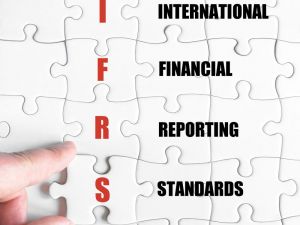IFRS Accounting – International Financial Reporting Standards
Course Overview
Our IFRS course in Dubai stands out as a premier program for professionals seeking expertise in international financial reporting standards. In today’s financial landscape, the transition to IFRS9 has revolutionized risk management, requiring a proactive approach to credit risk measurement and compliance. Gone are the days of reactive banking; now, financial sectors must embrace forward-looking credit risk rating systems and adhere to Basel’s guidelines. Our comprehensive training equips participants with the knowledge and skills needed to navigate these changes effectively.
Participants in our IFRS course in Duabi learn to measure both Probabilities of Default and Loss Given Default, ensuring compliance with IRB standards. With a focus on practical applications, our course prepares professionals to detect issues early, manage portfolio risk, and implement strategic initiatives to mitigate credit risk over time. As the financial industry evolves, our program empowers participants to stay ahead of the curve and excel in an increasingly methodical yet dynamic world of financial reporting.
By enrolling in our IFRS course in Dubai, professionals can stay abreast of the latest developments in accounting standards and reporting practices. Our program offers a blend of theoretical knowledge and practical insights, providing participants with the tools they need to succeed in today’s competitive landscape. Whether you’re looking to enhance your skills or ensure compliance with international standards, our IFRS training program is the ideal choice for professionals in the financial sector.
Goal of Course:
Stay ahead in the global business environment by mastering IFRS. This course provides a thorough understanding of international financial reporting standards, ensuring compliance and global financial transparency.
Certainly, the depth of topics is large, and the spread of knowledge to manage them is wide. We aim to focus on the essential parts, and by combining essential modules on techniques and methodologies used in detecting problems early ad preserving the Expected Loss at the obligor and portfolio level, the program should give participants with sufficient tools to manage the path to IFRS 9 compliance.
Course Objectives:
The objectives of IFRS course in Dubai are to help you:
- Comply with IFRS financial statement requirements, including accounting policies and disclosures
- Understand the rules relating to first-time adoption of IFRS Implement the IFRS recognition and measurement rules for assets, liabilities, revenues, expenses, gains and losses
- Apply IFRS ‘fair value’ measurement requirements
- Increase planning opportunities through awareness of likely future IFRS changes, including prospects for global convergence of major national accounting standards.
Duration:
5 days
Training Objectives
- Understand to IFRS 9 and how it will impact banks
- Learn to detect Problems Early using Cash Flows and the right Ratios
- Learn to focus on forward indicators such as Sensitizing Obligors, Stress Testing Portfolios (Macro and Micro), and avoiding the pit-falls of traditional ratio analysis.
- Learn how to manage PDs by using Target Market selection and Risk Acceptance Criteria to manage the constitution of the portfolio.
- Learn how to manage LGDs through better structuring and matching facilities to obligor needs.
- Learn measuring and managing ELs through Portfolio Risk Ratings.
- Learn managing Pricing and Cross Sell to ensure positive RAROC.
- Use Qualitative Analysis as a forward looking assessment tool.
- To understand Remedial Action Techniques to avoid Stages 2 and 3 under IFRS 9.
- To understand the pitfalls of risk rating methodologies and ways to ensure IFRS 9 compliance.
Module Outlines
Module 1: Introduction
- Introduction
- IASB and IFRS
- Framework for Preparation and Presentation of Financial Statements
Module 2: Financial Statements
Presentation and Disclosures Income Statement Ratios
Explain why accounting is important and list the users of accounting information
Describe the organizations and rules that govern accounting
Module 3: Accounting
Describe the accounting equation, and define assets, liabilities, equity, revenues and expenses
Explain accounts as they relate to the accounting equation and describe common accounts
Compare cash basis versus accrual basis accounting
Module 4: Revenue Recognition and Construction Contracts
Revenue (IAS 18)
Construction contracts (IAS 11)
Module 5: Inventories
Inventories (IAS 2)
Module 6: Non-current Assets
Property, plant and equipment (IAS 16) Borrowing costs (IAS 23)
Investment property (IAS 40) Intangible assets (IAS 38)
Impairment of assets (IAS 36)
Module 7: Provisions and Employee Benefits
Provisions, contingent liabilities and assets (IAS 37) Employee benefits (IAS 19)
Share-based payment (IFRS 2)
Module 8: Leases (IAS 17)
Module 9: Financial Instruments (an overview)
Presentation (IAS 32)
Recognition and measurement (IAS 39) Disclosures (IFRS 7)
Module 10: First time adoption of IFRS (IFRS 1)
Module 11: The new Revenue and Leasing Standards
Revenue from contracts with customers (IFRS 15) – effective from January 1, 2018
Leases (IFRS 16) – effective from January 1, 2019
Customized Learning
Leap To Success is offering a variety of learning options to meet current realities and can be adapted to suit your business needs. These options include variants of online, blended and on-site course formats.
Face To Face Learning
Enabling you to have a face to face interactive and engaging learning experiences led by renowned industry experts and thought leaders with extensive practical experience who will employ a variety of interactive learning techniques, including short high-impact videos, case studies, assessments, role plays, in addition to on-going support.
Virtual Learning Labs
Interactive online learning held in real-time using Zoom and are led by international subject matter experts who incorporate case studies, breakout rooms, guided practice, simulations and discussions to maximise your learning experience.
General Methodology
Similar to any L2S training program, this program offers an interactive learning experience in which will allow the delegates to reflect on their learning through an informative, indulging, and fun classroom experience. The design of the training session focuses on the following attributes.
- Concrete Experience: The delegates will learn by doing
- Reflective Observation: Reflecting on the newly experienced skill-set
- Abstract Conceptualization: Developing deeper understanding to the learned concepts
- Active Experimentation: providing the delegates with realistic tools that can be tested in the real life
Sign Up For the Course

